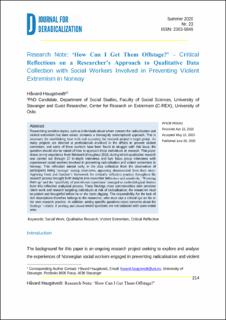| dc.contributor.author | Haugstvedt, Håvard | |
| dc.date.accessioned | 2021-02-19T14:12:20Z | |
| dc.date.available | 2021-02-19T14:12:20Z | |
| dc.date.created | 2020-06-26T13:54:02Z | |
| dc.date.issued | 2020-06 | |
| dc.identifier.citation | Haugstvedt, H. (2020) Research Note: ‘How Can I Get Them Offstage?’ – Critical Reflections on a Researcher’s Approach to Qualitative Data Collection with Social Workers Involved in Preventing Violent Extremism in Norway. Journal for Deradicalization, 23 | en_US |
| dc.identifier.issn | 2363-9849 | |
| dc.identifier.uri | https://hdl.handle.net/11250/2729301 | |
| dc.description.abstract | Researching sensitive topics, such as individuals about whom concern for radicalisation and violent extremism has been raised, demands a thoroughly contemplated approach. This is necessary for establishing trust with and accessing the research project’s target group. As many projects are directed at professionals involved in the efforts to prevent violent extremism, and some of these workers have been found to struggle with this issue, the question should also be raised of how to approach these individuals in research. This paper draws on my experience from fieldwork throughout 2018, during which qualitative research was carried out through 17 in-depth interviews and two focus group interviews with experienced social workers involved in preventing radicalisation and violent extremism in Norway. This reflection started early in the data collection from the observation of participants being ‘onstage’ during interviews, appearing disconnected from their story. Applying Fook and Gardner’s framework for critically reflective practice throughout the research process brought forth insights into researcher behaviour and sensitivity. ‘Warming them up’ and the ‘specificity of practitioner experience’ emerged as methodological themes from this reflective analytical process. These findings share commonalities with sensitive client work and research targeting individuals at risk of radicalisation; the researcher must be patient and thoughtful before he or she starts digging. The responsibility for the lack of rich descriptions therefore belongs to the researcher, who must cast a critical eye on his or her own research practice. In addition, asking specific questions raises concerns about the findings’ validity if probing and closed-ended questions are not balanced with open-ended ones. | en_US |
| dc.language.iso | eng | en_US |
| dc.publisher | Daniel Koehler | en_US |
| dc.rights | Attribution-NonCommercial-NoDerivatives 4.0 Internasjonal | * |
| dc.rights.uri | http://creativecommons.org/licenses/by-nc-nd/4.0/deed.no | * |
| dc.subject | terror | en_US |
| dc.subject | radikalisering | en_US |
| dc.subject | sosialt arbeid | en_US |
| dc.subject | ekstremisme | en_US |
| dc.subject | kritisk refleksjon | en_US |
| dc.title | Research Note: ‘How Can I Get Them Offstage?’ – Critical Reflections on a Researcher’s Approach to Qualitative Data Collection with Social Workers Involved in Preventing Violent Extremism in Norway | en_US |
| dc.type | Peer reviewed | en_US |
| dc.type | Journal article | en_US |
| dc.description.version | publishedVersion | en_US |
| dc.subject.nsi | VDP::Samfunnsvitenskap: 200::Statsvitenskap og organisasjonsteori: 240::Internasjonal politikk: 243 | en_US |
| dc.source.volume | 2020 | en_US |
| dc.source.journal | Journal for Deradicalization | en_US |
| dc.source.issue | 23 | en_US |
| dc.identifier.cristin | 1817313 | |
| cristin.ispublished | true | |
| cristin.fulltext | original | |
| cristin.qualitycode | 1 | |

